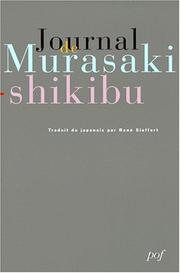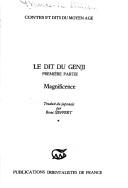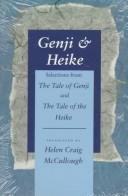| Listing 1 - 10 of 15 | << page >> |
Sort by
|
Book
Year: 1963 Publisher: München : Deutscher Taschenbuch Verlag,
Abstract | Keywords | Export | Availability | Bookmark
 Loading...
Loading...Choose an application
- Reference Manager
- EndNote
- RefWorks (Direct export to RefWorks)
Book
Year: 2021 Publisher: Project Gutenberg
Abstract | Keywords | Export | Availability | Bookmark
 Loading...
Loading...Choose an application
- Reference Manager
- EndNote
- RefWorks (Direct export to RefWorks)

ISBN: 2716901074 2716903247 9782716901079 Year: 1978 Publisher: Paris Publications orientalistes de France
Abstract | Keywords | Export | Availability | Bookmark
 Loading...
Loading...Choose an application
- Reference Manager
- EndNote
- RefWorks (Direct export to RefWorks)
Authors, Japanese --- Ecrivains japonais --- Biography --- Biographies --- Murasaki Shikibu, --- Diaries --- Journaux intimes --- Japan --- Court and courtiers --- History --- J5630 --- J5923 --- J5710 --- -Japanese authors --- Japan: Literature -- literary diaries, letters and accounts of travel --- Japan: Literature -- premodern fiction and prose -- Heian period (794-1185) --- Japan: Literature -- poetry -- Waka, tanka, chōka --- Murasaki Shikibu --- -Diaries --- Court and courtiers. --- -Authors, Japanese --- Biography. --- -Japan: Literature -- literary diaries, letters and accounts of travel --- -J5630 --- Diaries. --- Nihon --- Nippon --- Iapōnia --- Zhāpān --- I︠A︡ponii︠a︡ --- Yapan --- Japon --- Japão --- Japam --- Mư̄ang Yīpun --- Prathēt Yīpun --- Yīpun --- Jih-pen --- Riben --- Government of Japan --- Fujiwara, Murasaki, --- Murasaki Sikibu, --- Tō Shikibu, --- 紫式部, --- Zi Shibu, --- Authors, Japanese - Biography --- Murasaki Shikibu, - 978?- - Diaries --- Japan - History - Heian period, 794-1185 --- Japan - Court and courtiers --- Murasaki Shikibu, - 978? --- -Japan

ISBN: 2716902070 2716900981 9782716900980 Year: 1978 Publisher: Paris: Publications orientalistes de France,
Abstract | Keywords | Export | Availability | Bookmark
 Loading...
Loading...Choose an application
- Reference Manager
- EndNote
- RefWorks (Direct export to RefWorks)
Japan --- Social life and customs --- Fiction --- Japan - Social life and customs - To 1600 - Fiction
Book
Abstract | Keywords | Export | Availability | Bookmark
 Loading...
Loading...Choose an application
- Reference Manager
- EndNote
- RefWorks (Direct export to RefWorks)
Book
Abstract | Keywords | Export | Availability | Bookmark
 Loading...
Loading...Choose an application
- Reference Manager
- EndNote
- RefWorks (Direct export to RefWorks)
Book
Abstract | Keywords | Export | Availability | Bookmark
 Loading...
Loading...Choose an application
- Reference Manager
- EndNote
- RefWorks (Direct export to RefWorks)
Book
ISBN: 0472128051 047203832X Year: 2000 Publisher: Ann Arbor, Michigan : University of Michigan Press,
Abstract | Keywords | Export | Availability | Bookmark
 Loading...
Loading...Choose an application
- Reference Manager
- EndNote
- RefWorks (Direct export to RefWorks)
Yosano Akiko (1878-1942) has long been recognized as one of the most important literary figures of prewar Japan. Her renown derives principally from the passion of her early poetry and from her contributions to 20th-century debates about women. This emphasis obscures a major part of her career, which was devoted to work on the Japanese classics and, in particular, the great Heian period text The Tale of Genji. Akiko herself felt that Genji was the bedrock upon which her entire literary career was built, and her bibliography shows a steadily increasing amount of time devoted to projects related to the tale. This study traces for the first time the full range of Akiko's involvement with The Tale of Genji. The Tale of Genji provided Akiko with her conception of herself as a writer and inspired many of her most significant literary projects. She, in turn, refurbished the tale as a modern novel, pioneered some of the most promising avenues of modern academic research on Genji, and, to a great extent, gave the text the prominence it now enjoys as a translated classic. Through Akiko's work Genji became, in fact as well as in name, an exemplum of that most modern of literary genres, the novel. In delineating this important aspect of Akiko's life and her bibliography, this study aims to show that facile descriptions of Akiko as a "poetess of passion" or "new woman" will no longer suffice.
Yosano, Akiko, --- Murasaki Shikibu, --- Criticism and interpretation. --- Hō, Shō, --- Hō, Akiko, --- Yosano, Akiko Hō, --- 与謝野晶子, --- 與謝野晶子, --- 興謝野晶子,

ISBN: 0804722579 0804722587 Year: 1994 Publisher: Stanford (Calif.) : Stanford University,
Abstract | Keywords | Export | Availability | Bookmark
 Loading...
Loading...Choose an application
- Reference Manager
- EndNote
- RefWorks (Direct export to RefWorks)
Japanese fiction --- Translations into English --- Murasaki Shikibu, --- Murasaki Shikibu, --- Translations into English. --- Heike monogatari --- Translations into English.
Book
ISBN: 9780824818586 Year: 1997 Publisher: Honolulu, Hi. : University of Hawaiʻi Press,
Abstract | Keywords | Export | Availability | Bookmark
 Loading...
Loading...Choose an application
- Reference Manager
- EndNote
- RefWorks (Direct export to RefWorks)
"In this subtle and highly original reading of Murasaki Shikibu's eleventh-century classic The Tale of Genji (Genji monogatari), Doris G. Bargen explores the role of possessing spirits (mono no ke) from a female viewpoint. In several key episodes of the Genji, Heian noblewomen (or their mediums) tremble, speak in strange voices, and tear their hair and clothing while under the spell of mono no ke. For literary critics, Genji, the male protagonist, is central to determining the role of these spirits. From this male-centered perspective, female jealousy provides a convenient explanation for the emergence of mono no ke within the polygynous marital system of the Heian aristocracy. Yet this conventional view fails to take into account the work's female authorship and its largely female audience. Relying upon anthropological as well as literary evidence, Doris G. Bargen foregrounds the motives of the possessed character and located mono no ke within the politics of Heian society, interpreting spirit possession as a female strategy adopted to counter male strategies of empowerment. Possessions become "performances" by women attempting to redress the balance of power; they subtly subvert the structure of domination and significantly alter the construction of gender."--Jacket.
Besessenheit. --- Bezetenheid. --- Geesten. --- LITERARY CRITICISM --- Possession par les esprits dans la littérature. --- Spirit possession in literature. --- Women in literature. --- Asian --- General. --- Murasaki Shikibu, --- Murasaki Shikibu. --- Characters --- Women. --- Genji monogatari (Murasaki Shikibu).
| Listing 1 - 10 of 15 | << page >> |
Sort by
|

 Search
Search Feedback
Feedback About
About Help
Help News
News